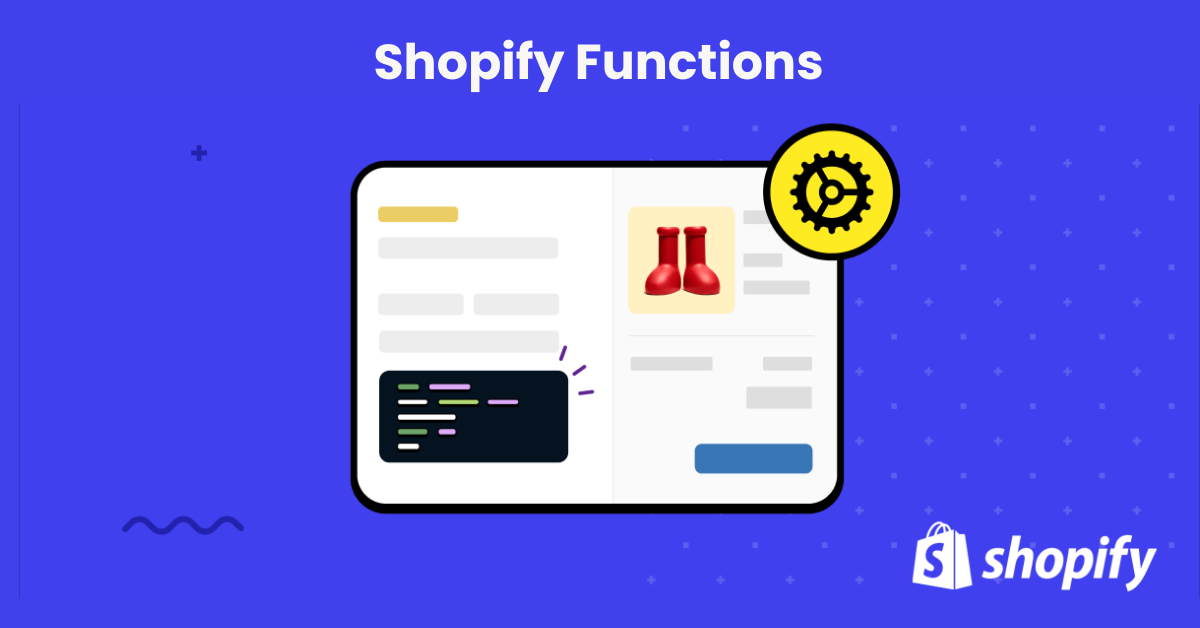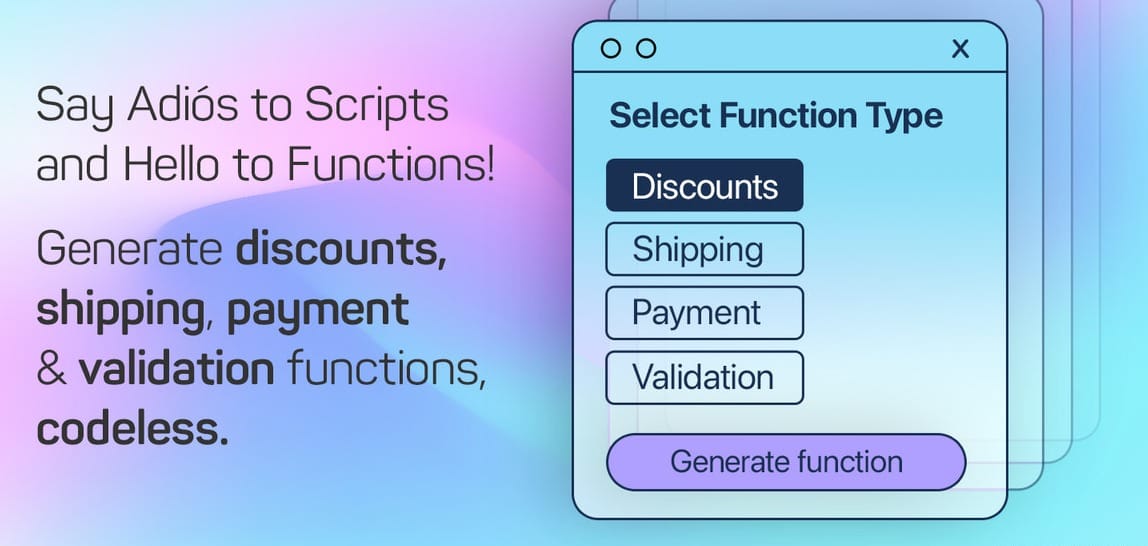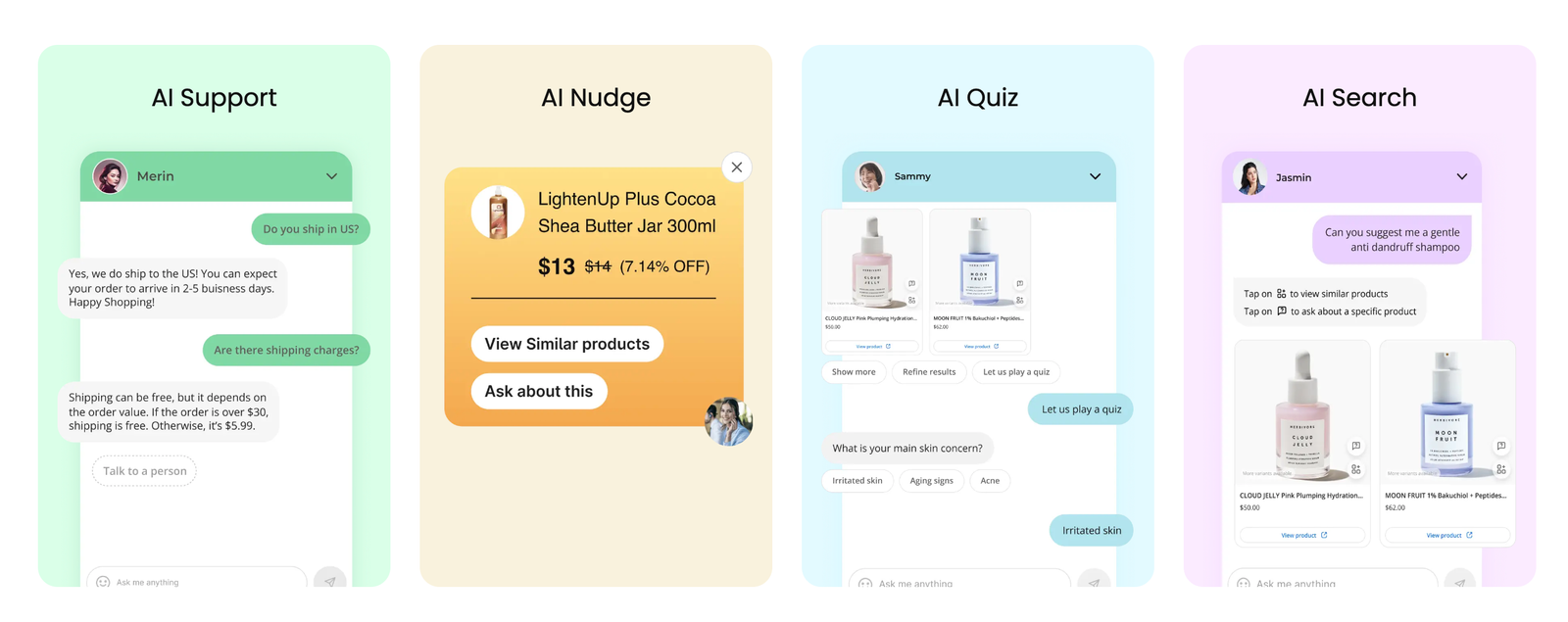Exploring the Core Shopify Functions for E-commerce Success

Navigating the world of e-commerce can be complex, but Shopify simplifies this journey by offering a suite of core functions designed to empower online store owners. From product management to payment processing, these functions are the backbone of a successful Shopify store. This blog will take a closer look at these essential features, providing insights into how they can help you manage your store more effectively, engage with your customers, and drive sales. Whether you're new to Shopify or looking to optimize your existing store, understanding these key functions is crucial for leveraging the full potential of your e-commerce platform and achieving success in the online marketplace.
What are Shopify Functions?

Shopify Functions is a powerful feature within the Shopify platform that allows store owners to customize and extend the capabilities of their online shops. Essentially, it enables users to tailor various aspects of their e-commerce operations, from checkout processes to discounts and payment methods, without the constraints of predefined settings. By using Shopify Functions, merchants can create unique shopping experiences that are optimized for their specific business needs and customer preferences.
This feature is particularly beneficial for those looking to implement custom logic and workflows that go beyond the standard offerings of the platform. It offers the flexibility to innovate and differentiate in a competitive market. For developers, Shopify Functions provides a robust environment to build and deploy these custom solutions efficiently. Overall, Shopify Functions is a key tool for enhancing the functionality and performance of a Shopify store, making it a valuable asset for businesses aiming to grow and adapt in the ever-evolving e-commerce landscape.
Types of Shopify Functions

Shopify Functions encompasses a variety of capabilities tailored to enhance and personalize the e-commerce experience on the Shopify platform. Here are the primary types of Shopify Functions available to store owners:
- Checkout Customization: Shopify checkout functions can allow for modifications to the checkout process, enabling a more personalized checkout experience that can include custom payment options, special discounts, and unique checkout fields.
- Discounts and Promotions: Through custom like Shopify discount functions, merchants can create sophisticated discount logic that goes beyond standard percentage-off sales, including buy-one-get-one offers, tiered discounts, and loyalty rewards.
- Shipping and Fulfillment: Shopify shipping functions enable customization of shipping rules and fulfillment processes, allowing for dynamic shipping rates, special handling instructions, and integration with third-party logistics services.
- Payment Methods: Custom payment functions allow for the integration of alternative payment gateways and methods, offering flexibility in how customers can pay for their purchases.
How to use Shopify functions?
Shopify Functions operates by allowing store owners to implement custom code directly into Shopify’s serverless platform, enabling them to modify and enhance their store's standard functionalities. This process starts when a merchant identifies a specific need or feature that isn't covered by Shopify's out-of-the-box solutions. Using Shopify Functions, developers can then write custom logic in supported languages to address these unique requirements.
The process typically involves:
- Identifying the Need: Determining which aspect of the Shopify store requires customization or enhancement, such as checkout processes, discounts, or payment methods.
- Development: Writing custom functions using Shopify’s development tools. This code directly interacts with Shopify’s backend, allowing for a seamless integration of new features without impacting store performance.
- Deployment: Once developed, these custom functions are deployed to the Shopify environment, where they are executed within the platform's secure, scalable infrastructure.
- Execution: The custom functions are triggered based on specific events or conditions within the store, such as a customer reaching the checkout or applying a discount code.
Why use Shopify Functions?

Choosing Shopify Functions as a tool for your e-commerce platform offers several compelling advantages aimed at enhancing the flexibility, functionality, and uniqueness of your online store. Here's why Shopify Functions can be a game-changer for Shopify merchants:
- Customization at Its Core: Shopify Functions allows for deep customization of the shopping experience, enabling merchants to tailor aspects such as checkout processes, payment options, and discount strategies to their specific business model and customer needs.
- Improved Shopping Experience: By enabling personalized interactions and streamlined processes, Shopify Functions can significantly enhance the overall shopping experience for customers, potentially increasing satisfaction and loyalty.
- Increased Operational Efficiency: Automating and customizing various store operations reduces the manual effort required to manage the store, allowing merchants and their teams to focus on strategic growth activities instead.
- Competitive Differentiation: In a crowded e-commerce landscape, the ability to offer unique features and functionalities can set your store apart from competitors, offering customers a compelling reason to choose your store over others.
- Seamless Integration: Shopify Functions integrates directly into the Shopify platform, ensuring that customizations work seamlessly with existing features without compromising site performance or security.
- Scalability: As your business grows, Shopify Functions can scale with you, providing the flexibility to continuously adapt and expand your store’s capabilities to meet evolving business needs and customer expectations.
Shopify Functions Examples
Shopify Functions provide merchants with the flexibility to customize and enhance their online stores in ways that standard Shopify features do not permit. Below are detailed examples of how Shopify Functions can be utilized to improve various aspects of an e-commerce store:
- Custom Checkout Experience:
Tailor the checkout process to include additional fields for gift messages or special delivery instructions, ensuring a personalized checkout experience that caters to the unique needs of your customers.
- Dynamic Pricing and Discounts:
Implement complex discount logic that can adjust pricing based on factors like purchase quantity, customer loyalty status, or inventory levels, encouraging larger purchases and rewarding repeat customers.
- Personalized Product Recommendations:
Create functions that analyze customer browsing and purchasing history to offer personalized product suggestions directly on product pages or through marketing emails, increasing relevance and boosting sales.
- Automated Loyalty Rewards:
Develop a loyalty program that automatically applies rewards at checkout based on customer activity, such as the number of purchases made or the total amount spent over time.
- Custom Payment Options:
Integrate unique payment methods that are specific to certain customer segments or geographic locations, offering greater flexibility and improving customer satisfaction.
- Inventory-Based Promotions:
Set up promotions that automatically trigger based on inventory levels, such as offering discounts on overstocked items, helping to manage stock levels more effectively.
- Enhanced Shipping Rules:
Customize shipping options and pricing based on factors like order size, weight, or destination, allowing for more accurate shipping costs and options tailored to customer needs.
Shopify functions limitations
While Shopify Functions offer a robust set of tools for enhancing your e-commerce store, there are certain limitations to be aware of:
- Platform-Specific: Shopify Functions are exclusive to the Shopify platform. This means that their utility and applicability are confined to Shopify stores only, limiting cross-platform flexibility.
- Learning Curve: Implementing Shopify Functions requires a certain level of technical skill and understanding of Shopify’s development environment. This could pose a challenge for merchants without a technical background.
- Customization Limits: Although Shopify Functions provide customization capabilities, they are still bound by the platform's inherent limitations. Not all desired customizations may be feasible within the scope of Shopify Functions.
- Dependency on Shopify’s Infrastructure: The performance and availability of Shopify Functions are dependent on Shopify’s infrastructure, which could affect the reliability of custom features during high-traffic periods or outages.
- Cost Implications: Utilizing advanced features or needing extensive customizations through Shopify Functions might incur additional costs, either through hiring developers or through increased subscription plans for necessary resources.
Grow your Shopify store with Manifest AI

Transform your Shopify store with Manifest AI, an advanced tool designed to leverage artificial intelligence for enhancing customer experience and streamlining operations. Manifest AI introduces a set of key features tailored to boost engagement, satisfaction, and sales.
AI Support instantly resolves common customer queries, reducing wait times and freeing up your team to tackle complex issues, thereby elevating customer satisfaction.
AI Nudges intelligently guide customers through their shopping journey by offering personalized product recommendations and reminders about previously viewed products, encouraging additional purchases.
AI Quizzes engage customers with interactive questions to understand their preferences, enabling tailored product suggestions that increase the likelihood of conversions.
AI Search revolutionizes product discovery with natural language processing, allowing shoppers to find exactly what they're looking for with ease and precision.
Conclusion
In summary, the core functions of Shopify offer a robust foundation for e-commerce success, providing store owners with the essential tools needed to build, manage, and grow their online presence effectively. From product management to payment processing and customer engagement, Shopify's comprehensive features support a wide range of business needs. By fully utilizing these functions, merchants can enhance the shopping experience for their customers, streamline their operations, and adapt to the evolving demands of the digital marketplace. Embracing Shopify's core capabilities is a strategic step towards achieving sustainable growth and competitive advantage in the world of e-commerce.

.png)
